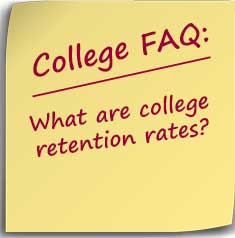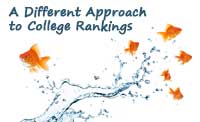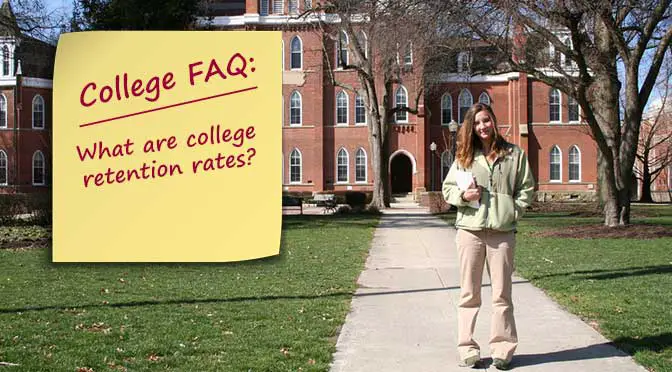 I don’t know why, but whenever I bring up comparing graduation rates when considering colleges, I get a fairly hostile reaction–at least in online forums. It’s almost as if I suggested using a school’s football rankings as a way to pick the school. So what is wrong with looking at college graduation rates?
I don’t know why, but whenever I bring up comparing graduation rates when considering colleges, I get a fairly hostile reaction–at least in online forums. It’s almost as if I suggested using a school’s football rankings as a way to pick the school. So what is wrong with looking at college graduation rates?
Graduation Rates
How Come No One is Talking About Pathetic College Graduation Rates?
 If college graduation rates were high school graduation rates, every politician, pundit, and policy wonk would be in the mainstream media talking about the crisis of college dropouts and devising ways to tie faculty evaluation to student graduation. Not that such an approach is necessarily the answer. After all, given the situation with high school graduation rates, I’m not sure that we would actually come up with any solutions but, boy, we sure would be talking about it.
If college graduation rates were high school graduation rates, every politician, pundit, and policy wonk would be in the mainstream media talking about the crisis of college dropouts and devising ways to tie faculty evaluation to student graduation. Not that such an approach is necessarily the answer. After all, given the situation with high school graduation rates, I’m not sure that we would actually come up with any solutions but, boy, we sure would be talking about it.
50-50 Profile: Western Illinois University
College profile of Western Illinois University including graduation rates and financial aid information.
448 Colleges That Accept and Graduate at Least Half of All Students (It’s more impressive than you think)
 Finally! This is the longest I’ve waited to update my list of 50-50 Colleges. For reasons unknown, the Integrated Postsecondary Education System (IPEDS) only recently released the updated graduation rates although they have been showing up on College Navigator for some time now. I try not to take it personally. So while I’m not quite yet finished updating the DIY College Search Spreadsheet, I have generated the new listing of 50-50 Colleges.
Finally! This is the longest I’ve waited to update my list of 50-50 Colleges. For reasons unknown, the Integrated Postsecondary Education System (IPEDS) only recently released the updated graduation rates although they have been showing up on College Navigator for some time now. I try not to take it personally. So while I’m not quite yet finished updating the DIY College Search Spreadsheet, I have generated the new listing of 50-50 Colleges.
What are college retention rates?
 The college retention rate is the percentage of full-time students who return after their freshman year. The retention rate is not the same thing as the graduation rate. There may actually be significant differences between the two numbers.
The college retention rate is the percentage of full-time students who return after their freshman year. The retention rate is not the same thing as the graduation rate. There may actually be significant differences between the two numbers.
The retention rate will always be higher than the graduation rate which is why prospective college applicants will often hear about it. However, colleges with similar retention rates may have dramatically different graduation rates.
What You Need to Know About the DIY College Rankings College Profile
 In each of my newsletters, I include a brief profile of a 50-50 college. For those new to my website, a 50-50 school is a college that accepts at least 49% of students and has at least a 49% graduation rate. I use the four-year rate for private schools and the five-year rate for public. You can download a complete list here.
In each of my newsletters, I include a brief profile of a 50-50 college. For those new to my website, a 50-50 school is a college that accepts at least 49% of students and has at least a 49% graduation rate. I use the four-year rate for private schools and the five-year rate for public. You can download a complete list here.
I have also created profiles for over 350 of them so far and am gradually getting them all listed. You can find individual profiles here. With all of the college search websites available, it wouldn’t be unreasonable for you to wonder why I bother, or more importantly, why you should bother to look at them.
10 Things You Should Know About the 2016 US News College Rankings
 Despite the newly revised federal College Scorecard released this weekend along with new data elements for evaluating schools, US News College Rankings probably isn’t too worried about losing its fan base. After all, you can’t find out what THE BEST college is in the nation with just a click. And let’s face it, everyone loves a horse race–no one cares what the trainers are actually doing. But for those who might actually be interested in how the schools achieved their rankings, you should be aware of the following:
Despite the newly revised federal College Scorecard released this weekend along with new data elements for evaluating schools, US News College Rankings probably isn’t too worried about losing its fan base. After all, you can’t find out what THE BEST college is in the nation with just a click. And let’s face it, everyone loves a horse race–no one cares what the trainers are actually doing. But for those who might actually be interested in how the schools achieved their rankings, you should be aware of the following:
50-50 Highlights: Schools in The Washington Monthly College Rankings
 With the increasing number of college rankings available, it’s easy to forget that the US News Best College Rankings reigned without competition for 20 years. In 2005, The Washington Monthly published its alternative college rankings designed to evaluate the value of colleges as a social institution. For 10 years, The Washington Monthly College Rankings have been asking what can colleges do for society rather than ranking them on the quality of their students.
With the increasing number of college rankings available, it’s easy to forget that the US News Best College Rankings reigned without competition for 20 years. In 2005, The Washington Monthly published its alternative college rankings designed to evaluate the value of colleges as a social institution. For 10 years, The Washington Monthly College Rankings have been asking what can colleges do for society rather than ranking them on the quality of their students.
Wyoming College Resources, Graduation Rates, and Test Scores
Where to Start Looking to Find a College in Wyoming
 Wyoming has only one four-year institution with 500 or more full-time undergraduates, The University of Wyoming. Families looking for information on Wyoming specific scholarships should visit the Wyoming Department of Education. It has information on the Hathaway and Douvas scholarships. The website also links to the state’s community colleges and the University of Wyoming.
Wyoming has only one four-year institution with 500 or more full-time undergraduates, The University of Wyoming. Families looking for information on Wyoming specific scholarships should visit the Wyoming Department of Education. It has information on the Hathaway and Douvas scholarships. The website also links to the state’s community colleges and the University of Wyoming.



